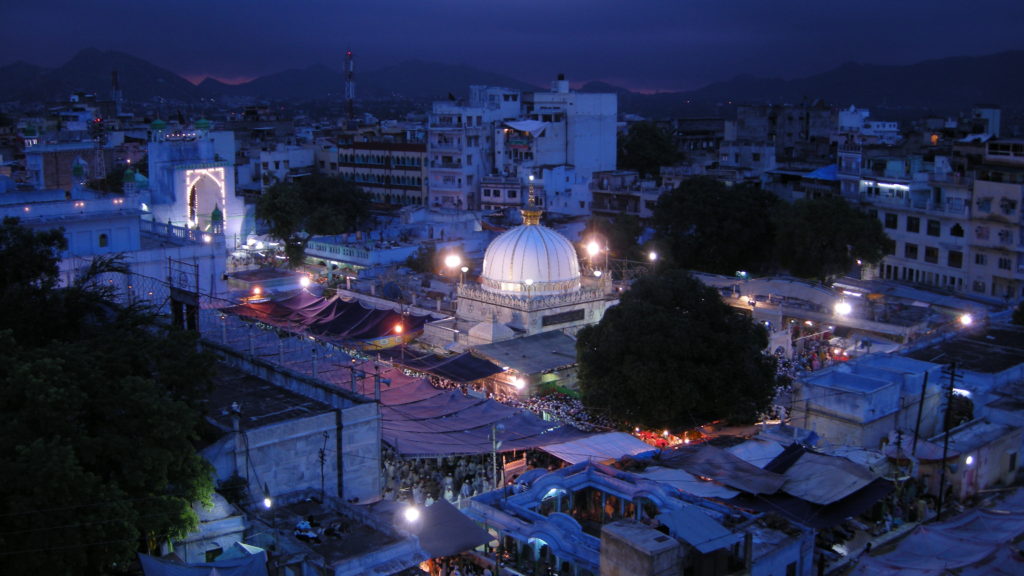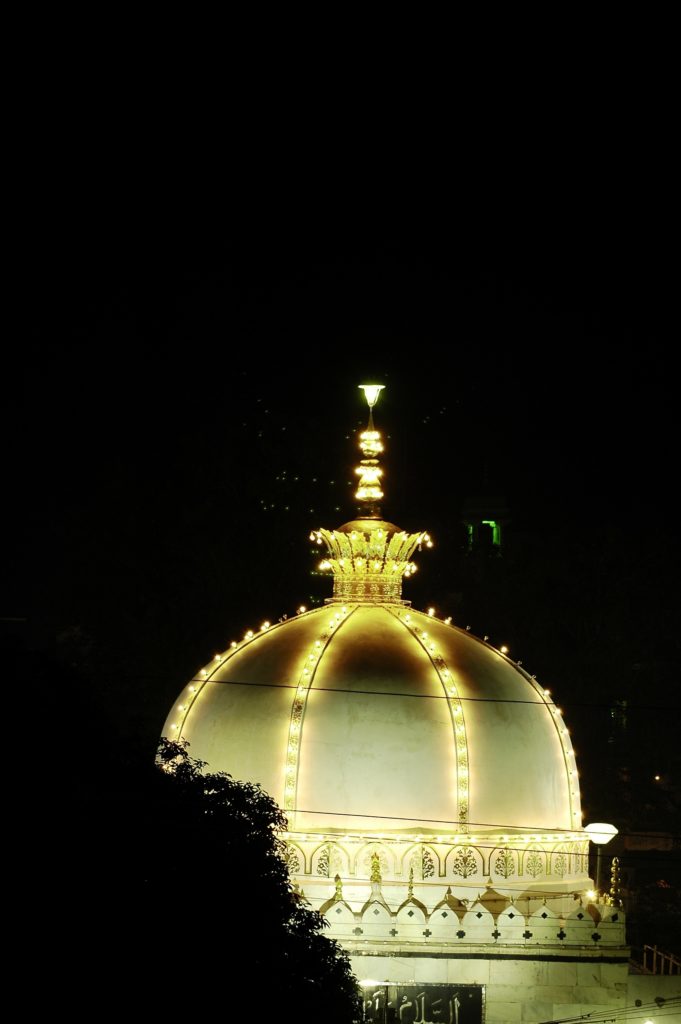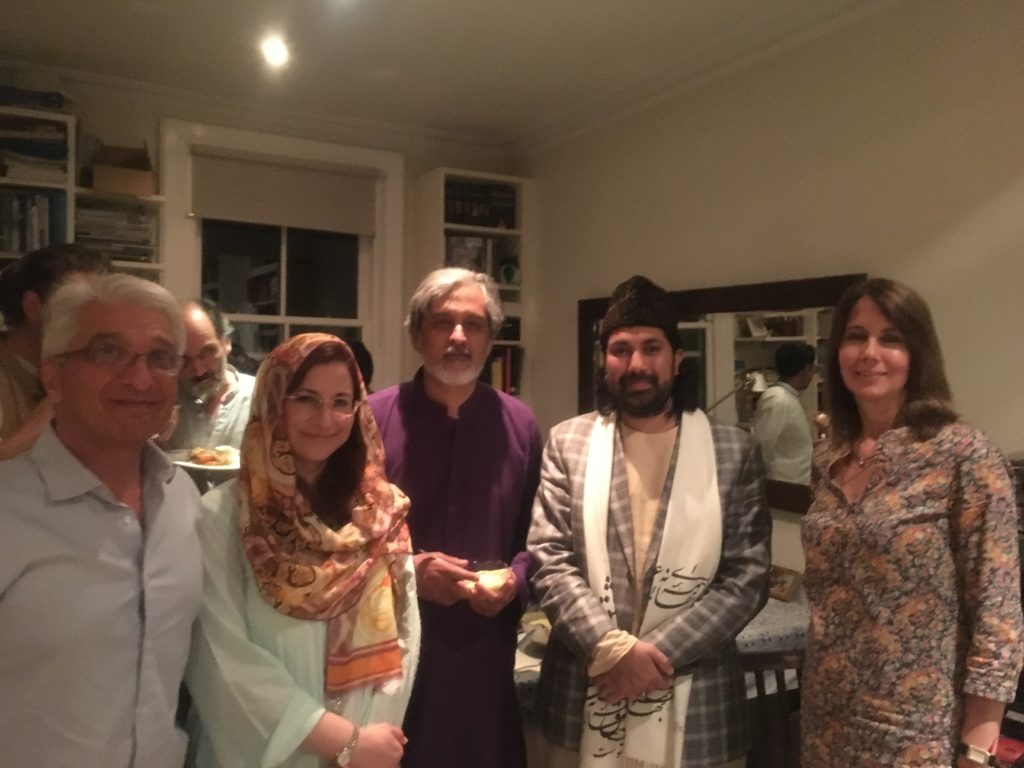The Call of the Sufi
By Dr. Amineh Hoti | Heritage | Published 7 years ago

Dargah Ajmer Sharif.
Following a conference in Germany, where scholars from the Abrahamic faiths from around the world met to find ways to understand each other, I arrived in London to a refreshingly warm summer. Worrying headlines continued of war in Syria and the displacement of millions of bewildered refugees. Simultaneously, there was news of tourists being stabbed on an Egyptian beach, the random killings of innocent civilians on London’s streets, and the discovery of bombs and other life-threatening devices on trains by people professing their Muslim identity, but their actions belying all characteristics of Abrahamic and Islamic values of compassion.
The direct consequence of all this: intensifying racial and religious hatred. During Ramadan, a white Englishman drove his car into a mosque, killing and injuring elderly people who were praying. And there are reports that white teenagers — aged 15 and 16 — are going around London on motorbikes, throwing acid on Asian/Muslim-looking people driving by in cars. Many individuals have been injured — some badly mutilated — due to these hate crimes.Ironically, one of the victims was not even Muslim. Meanwhile, according to a BBC documentary, the perpetrators of these actions claim that they would repeat them if they saw a chance, because, they contend, Asians and Muslims are everywhere, taking their jobs. This level of reciprocal hatred makes for an ugly situation, and has rendered the diverse population that is based in London uneasy, especially in public spaces.
In this context of fear and hatred, Kristiane Backer, a former MTV Europe presenter, inspired by the message of love in Islam, which resulted in her narrating her story in her book, From MTV to Mecca, invited me for dinner. Kristiane’s Chelsea home was distinguished by the Pakistani wooden carvings on her front window, and I noticed a gold framed couplet by Allama Iqbal hanging on her wall. She had prepared a delicious Pakistani meal of biryani, chicken handi, daal, raita, salad, baingan (aubergine) and bhindi (okra). And the spices and the salt were just right.
Among her guests were an English yogi who teaches at SOAS; Raaid, a Sri Lankan student of philosophy; Tariq Hamid, a Lahori computer scientist, and Major Uqbah Malik, a Pakistani army officer teaching at Sandhurst. Also present were Alexis McNally, a landscape gardener and convert to Islam; American film scriptwriter, Clare Pelham, who is Kristiane’s neighbour, Taimur Sahib, a Sufi scholar and the founder of Hast-o-Neest in Lahore; Sikander Choudhri and his wife, both young, bright Pakistani lawyers; and Umku, a daughter of Begum Abida Hussain, Pakistan’s former ambassador to the US. The chief guest was 34-year-old Syed Salman Chishty — a direct male descendant of the famous Sufi saint, Khwaja Moinuddin Chishty — who is interred in his dargah (shrine) in Ajmer Sharif, where each year on his death anniversary over one million people from all faiths descend to pay their respects in what is called an urs celebration.

Syed Salman Chishty began the conversation that evening by telling us about Ajmer Sharif. In his book Journey into Islam, Ambassador-Professor Akbar S. Ahmed had noted that Ajmer was one of three models for Muslims: Ajmer was the universal model, whereas the Wahabi/Salafi Deobandis, in response to colonialism, believed in creating boundaries around Islam. Finally, there was the Aligarh model, which embraced modernity and balanced it with faith.
From the 11th century onwards, during the rule of the Hindu Prithvi Raj dynasty, when there was a strong hierarchy and an impenetrable caste system in the subcontinent, and a few were more privileged than all the others, the message of Khwaja Sahib from Ajmer was instantly appealing, especially to those who were poor and living on the periphery. It was a message based on the idea of love and acceptance of humanity in all its colours and faces. “People can be themselves — Muslims, Hindus, Sikhs, Christians, everyone,” said Salman Sahib. “Khwaja Sahib’s message is a universal one, inspired by the Prophet Muhammad (PBUH), and spread not by words, but through actions. Khwaja Sahib carried so much grace and light (noor), that he attracted many people. He spoke to everyone, but never tried to convert anyone. That is why one million people of all faiths, and even those who profess no religion, come to Ajmer every year.”
Kristiane Backer noted how, when she attended Syed Salman Chishty’s wedding last year and travelled through Rajasthan, everyone she met — from Sikh to Jain, Hindu and Buddhist, to Muslim — said, “I love Ghareeb Nawaz (the affectionate nickname awarded to the saint) and we visit him once a year.”
Salman Sahib continued, “The corporate world focuses on the material dimension alone — the body, and instant gratification. This allows very little room for spiritual realisation.” And he said, “Silence is the best cure [of all ills]. It allows for a greater understanding of the self.” I felt this point was particularly relevant. Sufi Muslims aspire to be silent non-intrusive lovers of the Divine and of humanity. Conversely, and increasingly, there are those who impose their hostile views on others, and they sometimes do this violently. “The biggest struggle or ‘Jihad al Akbar,’ is, as the Prophet (PBUH) said, in fact, not war but fighting your own ego, your selfish desires and needs, and respecting the rights of others and the sanctity of life.” Sadly, it is the label of ‘Islamic terrorism’ that hits the headlines, with Muslims being branded ‘terrorists,’ while in reality they are often the victims (as in the case of the Rohingyas, Bosnians, and so many others).
About music in the Sufi tradition, qawwali, which is the remembrance and praise of God and His Prophet (PBUH), Salman Sahib said, “In the Chishty tradition, if a Sufi does not hear qawwali for more than three days it is said he dies, not physically, but spiritually.”
Major Uqbah — the dynamic young officer and first Muslim teaching at Sandhurst — joined the conversation, saying he knew very little about Ajmer. “There are many ways to understand religion and to live one’s faith. Sufism is just one of the ways, not the only way,” he maintained. While the conversation continued, Kristiane turned on the music: ‘Khwaja mere Khwaja,’ A.R. Rahman’s famous tribute to Hazrat Moinuddin Chishty.

Left to right: Arsallah Hoti, Dr Amineh Hoti (author), Taimur Sahib of Hast-o-Neest, Salman Chishty Sahib and Kristiane Baker.
At that, Salman Sahib’s face lit up. He disclosed, “A.R. Rehman is an Oscar-winning musician and a great Bollywood star. He used to sit behind the Shahi qawwals at Ajmer Dargah Sharif, just listening to them perform in humble silence. And when he became famous, he continued to come, to clap with the boys tasked with this, in accompaniment to the qawwali.”
Salman Sahib also had a story to relate about humility — a cornerstone of Sufism. He told us the story of the great Mughal Emperor, Akbar. As an emperor of one of the biggest dynasties the world has ever seen, Akbar at the peak of the 300-year rule of the Mughal Empire, desired a son to carry on his dynasty. Akbar had many wives, including a Muslim, a Hindu and a Christian, but he could not conceive a son. So, Khawaja Salim Chishty of Fatehpur Sikri — who happened to be Akbar’s spiritual teacher or pir, advised him to visit the famous saint, Khawaja Moinuddin Chishty in Ajmer Sharif, through whose prayers he said, Akbar might conceive a child. Khawaja Salim Chishty told Akbar it was not in his destiny to have a son, but if he wanted to reverse destiny — which he explained is not static, but constantly in flux by virtue of prayer and blessings — he had to visit the dargah of the saint, and not as a king, but as a faqir (beggar).
So Akbar — the most powerful and the greatest of the Mughal emperors — walked barefoot for 400 kilometres in the hot desert to arrive in Ajmer Sharif as a faqir, and entered the shrine in complete submission to God. Thereafter, his fervent plea for a son was answered, and Salim (later Emperor Jehangir) was born. In gratitude for the answer to his prayers, Akbar, donated one of the largest cooking cauldrons ever seen to the dargah at Ajmer Sharif, and till today — as then — volunteers cook in this massive pot, which is as big as a small house, preparing 3000 kg of food every day for the poor and for visitors, regardless of their religion, colour or gender. The hikmat (wisdom) behind this, Salman Sahib says, is continued service to humanity.
Salman Chishty’s personal background is interesting. He completed his early academic studies in St. Aneslem’s — A Catholic school — alongside continuing with traditional Islamic studies at the Dargah Ajmer Sharif. After graduating in Economics and Commerce from Mumbai Univeristy, he proceeded to Saudi Arabia to study Arabic, and while doing so, took a job at the Jeddah International Airport. He noticed during his time there that there were no studies in Sufism in Saudi Arabia, and got an insight into how Saudi universities work and who they fund. “Saudi universities look after you for the rest of your life and even fund mosques in your country,” he said. “But that also means they bring in some of their own particular way of thinking.”
Salman Sahib said that in Jeddah, he was lucky to find the Ba’Alawy — a small, hidden Sufi order originally from Hadhramaut, Yemen, who were driven out in the 18th and 19th centuries by the House of Saud / the Al—e-Saud. So in underground gatherings and soundproof rooms, those who still remained, carried out their spiritual dhikr (remembrances of the Divine). Salman Sahib said he visited them every Monday.
While in Jeddah, in February 2006, as Salman Sahib was preparing for his admission for a Masters degree in Islamic Studies at the Al Azhar University, Cairo, he received sad news from Ajmer: his father had died in a car crash. He could not attend the last rites of his father’s funeral, and this caused him great pain. But he said at that juncture he offered himself in service to the Divine’s way like “a blank paper,” and took over the seat of caring his father had left empty, for the thousands of people who visited the Dargah Sharif daily.
A few weeks after the enlightening evening at Kristiane’s, I met young Farid Chishty, a British Muslim lawyer in training, who says he is enrolled at Sandhurst as an officer. Farid plans to join the British Civil Service, but says he remains a passionate Pakistani. The young man talked about how he too is descended from Khwaja Ghareeb Nawaz of Ajmer but said the dargah he is a mureed (follower) at, is in Lahore. Farid recently took over as the leader of the Chishty Order, as the next generation Sufi leader (dastar) of his following in Lahore, Pakistan. His father, Mac Chishty, has been serving as a commander in the British police for 32 years, but Farid has continued to visit Pakistan and sees Sufism as the internal dimension of Islam. “It is recognising the universal truth and transcending boundaries that is key to peace-building,” he said.
In my fieldwork with Professor Akbar S. Ahmed, our research project called ‘Journey into Europe’ took us across nine European countries. We did in depth interviews of a wide array of people. Young Muslims in Europe generally expressed their “struggle” to fit into their home culture and that of their host communities. The challenge of the survival of universal human values and the balance of keeping one’s faith and culture in today’s world will lie with the young, but lessons of wisdom can be learnt from the saints.


